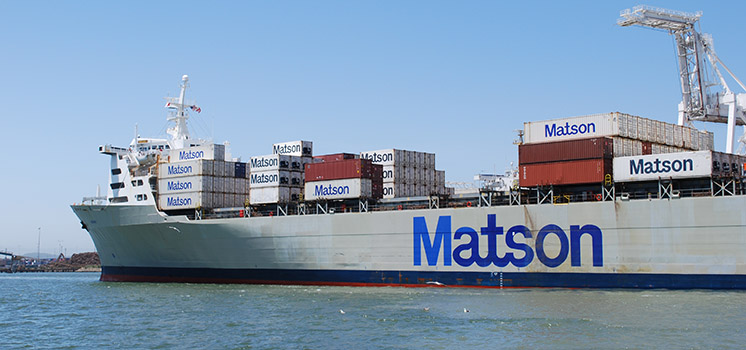San Francisco-based Prologis, which has recently been building new logistics warehousing at the Port of Oakland, is now planning to put up the largest waterfront industrial complex San Francisco has seen in half a decade.

Oakland-based Matson recently announced service to Okinawa, offering transit times from the U.S. West Coast up to four days faster than existing services in the market. Photo by Joel Williams
By Patrick Burnson
Published: January, 2017
San Francisco-based Prologis, which has recently been building new logistics warehousing at the Port of Oakland, is now planning to put up the largest waterfront industrial complex San Francisco has seen in half a decade.
Creation of a 1.16 million square foot project on 17 acres of land on a Bayview district site bordered by Rankin Street, Toland Avenue, Kirkwood Avenue and McKinnon Avenue will provide more working waterfront jobs, say advocates.
Meanwhile, Prologis has been awarded the “Leader in the Light” award in the industrial sector every year since 2012, when the National Association of Real Estate Investment Trusts (NAREIT) first introduced its current categories.
NAREIT’s judging criteria include results of the 2016 Global Real Estate Sustainability Benchmark (GRESB) Survey. Each year, Amsterdam-based GRESB measures the environmental and sustainability performance of property portfolios around the world based on a range of key performance indicators across all environmental, social and governance categories, including water and energy consumption, carbon dioxide emissions, sustainability policies and practices and stakeholder engagement.
In 2016, 759 property companies and funds participated in the survey, representing $2.8 trillion in gross asset value (GAV) and covering 66,000 assets in 63 countries on six continents. The survey is endorsed and watched closely by many of the world’s largest institutional investors, representing, in 2016, more than $7.6 trillion in institutional capital under management.
This award puts the spotlight on the importance of sustainability as a key measure of success in business, both within and outside the industry. Recognizing industrial REITs and real estate companies also helps to highlight the key areas in which these businesses are making progress in their sustainability efforts and practices.
State of the Port
The Port of Oakland’s latest maritime newsletter features a year-in-review commentary from Executive Director Chris Lytle, who made mention of the “giant steps” in 2016 toward sustainable future growth. Here’s an excerpt:
We finalized an agreement for construction of a 280,000-square-foot “cool port,” a state-of-the-art cold storage transload facility. It will lift overall cargo volume by redirecting chilled and frozen meat exports through Oakland. We continued to work on launching the 30-acre first phase of the Seaport Logistics Complex. It will be the West Coast’s only transshipment center operated within a port complex. We opened a $100 million rail storage yard to serve both operations.
Sustainability: Best of all, we reported results indicating that trade growth and environmental health can be compatible. The port announced in 2016 that it has cut diesel particulate emissions by 76 percent since 2005. Emissions from trucks have been reduced 98 percent! We’re not done with the effort to mitigate the impact of global trade on local air quality. But these numbers give us confidence that we can grow responsibly—protecting air quality while we stimulate the economy.
Outlook: It’s likely to be another year of uncertainty in 2017. There are some positive signs for shipping. Freight rates have bottomed out. Overbuilding of fleets has slowed. Consolidation is creating stronger liner companies. But it’s still a long way back to profitability for the industry. How will the Port of Oakland cope with the unsettled nature of shipping? As we always do: collaborating with partners up and down the supply chain to improve service for our customers.
Chris Lytle will also be giving his annual “state of the port” address at an industry luncheon sponsored by Women in Logistics (WIL) and the Pacific Maritime Shipping Association (PMSA) on January 12. Proceeds will go to WIL’s Scholarship Fund and Oakland Promise, whose goals are to triple the number of college graduates from Oakland within the next decade. The sponsors of the event are Matson, SSA Terminals and Devine Intermodal. Scott’s Jack London Square will again be the venue, with a start time of 11 a.m. For details, see www.pmsaship.com.
Matson Introduces Naha Service
Oakland-based Matson, a leading U.S. carrier in the Pacific, has announced the introduction of service to the Port of Naha, Okinawa as part of its expedited China–Long Beach Express (CLX) service, offering transit times from the U.S. West Coast up to four days faster than existing services in the market.
The new weekly service will make its first call at Naha on February 18. Westbound transit times to Naha will be 18 days from Oakland. Eastbound transits from Naha will be 17 days to Oakland.
Along with fastest transit times, Matson’s dedicated terminal operations on the West Coast provide shippers with late cutoff times, industry-leading truck turn times and use of Matson’s extensive owned chassis inventory throughout the United States.
Patrick Burnson is the Executive Editor of Logistics Management. (www.logisticsmgmt.com)

